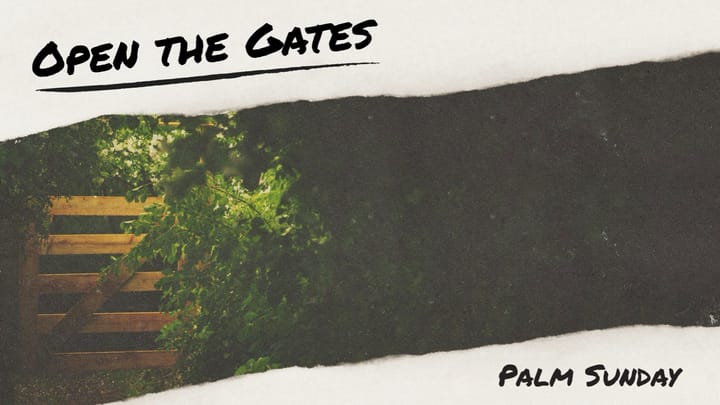Fairhaven Sermon 10-13-2024

In this week’s service, Rev. Dylan Parson opened with a humorous reflection on how spouses often seek opinions on small matters, only to dismiss the feedback if it doesn't align with what they already wanted to do. He then connected this lighthearted experience to the more serious issue of making significant decisions in a relationship, like buying a house or starting a family, where mutual input is crucial. Rev. Parson used this analogy to emphasize the importance of listening to and following Jesus' guidance, noting that while marriage is an equal partnership, our relationship with Jesus is not. We are called to trust and obey His direction fully, even when it’s challenging.
Rev. Parson focused on the story of the rich young man from Mark’s Gospel, who asked Jesus what he must do to inherit eternal life, but ultimately walked away when the answer was not what he wanted to hear. The sermon explored the difficulty of letting go of the things we hold dear—be it wealth, possessions, or other attachments—in order to follow Jesus fully. Rev. Parson challenged the congregation to reflect on their own lives, asking what they might be unwilling to give up if Jesus called them to do so, and reminded them that true discipleship requires a complete release of anything that stands between us and our relationship with God.
Transcript
Every spouse, I assume, has had some version of this same experience. So picture this. You are asked for your opinion on something by your husband or wife. And whether they know it or not when they ask, they have no intention of actually abiding by that opinion.
The three classics in my house include, and we didn't hit any of them this morning, does this outfit look better with these shoes or these shoes? Should I cut my hair short or keep it growing long? Or do you like blonde or brown? And there's no real point in any of these conversations, which I've had hundreds of times over the past 15 years, because it doesn't really matter what I say. And if my answer happens to confirm what she already wanted to do, that's great. That's what she'll do. And if not, it's, I don't know.
And then she'll choose the opposite thing. So it's more like at this point, guessing what the preexisting preference is. And it's fine. I'm not complaining.
It's low stakes. I don't really care what shoes you pick. Hair's good regardless. But this would become a significant problem in a relationship if the issues were more significant ones.
The kind of things that whenever you get married, you implicitly agree to treat as shared decisions. So should we buy a house? Should we have children? Should we spend $10,000 on a jet ski? These are high stakes decisions. The kind that I would like to be consulted about meaningfully. And when I'm asked for opinion, I'd like it to be taken into account.
I'd like it to be listened to. Because it's natural, after all, that if you choose to devote your life to spending it with someone else, that each partner is supposed to be committed to shaping that life together, according to each other's shared feelings, shared values. It's not a perfect analogy, but in some ways it's a similar situation to when we decide to devote our lives to Jesus as Lord. The major difference being that this is not an equal partnership.
A marriage is an equal partnership, but not so much with Jesus, because Jesus is God and we're not. Following Jesus, loving Jesus, by necessity requires orienting our lives towards what he asks of us. In the same way, listening to his response whenever we ask him what we should do. So this morning we're beginning a series that we're going to call the Upside Down Kingdom just for the rest of October, as we talk about the kingdom as Jesus teaches it in Mark's Gospel.
And so we begin with a story in Mark's Gospel today about a man who comes to Jesus knowing that Jesus has the answer that he's looking for. And then he declines to accept that answer when it isn't the one that he wants. So Jesus, while he's walking along the road, is met by this man who seems, at least tentatively, to have decided to follow Jesus. He sought him out here in the middle of nowhere and he calls him good teacher and he kneels on the ground at his feet.
This is a guy that's ready to listen to Jesus. He clearly holds Jesus in very high regard. And it seems he's only come to ask one question, and that is, What must I do to obtain eternal life? And you only really ask that of somebody whom you believe has some real spiritual authority. You don't just go up asking people that on the street.
And Jesus answers, as usual, without really giving an answer to start out with. He says to him, You know the commandments. Don't commit murder. Don't commit adultery.
Don't steal. Don't give false testimony. Don't cheat. He adds that one in there, interestingly enough.
Honor your father and your mother. The man presumably feels pretty good about his standing at this point because his record is clean. He says, Teacher, I have kept all of these things since I was a boy. But then comes the moment of truth.
Jesus stops on the road. I think they've been walking for the conversation until now, but he stops. And he looks at the man carefully. And Mark tells us that he looks at the man carefully and loved him.
He's saying this very compassionately. It's not supposed to be a gotcha or anything. And perhaps there's a moment of silence because Jesus has an idea of how the man's going to take it. But he answers the man again.
He says, You are lacking one thing. Go sell what you own and give the money to the poor. And then you will have treasure in heaven. And come, follow me.
And the man seems to be caught off guard by this. Mark doesn't tell us that the conversation continues any further. The man doesn't bargain. He doesn't argue with Jesus and be like, Well, what if I just give this much? None of that.
He's just dismayed and goes away saddened, Mark tells us. He goes away saddened. And it's really painful to read this story because this man has what is obviously a genuine desire to know Jesus, to attain eternal life. He knows that Jesus can give that to him.
And beyond that, he has this recognition that Jesus has the words of eternal life. What he speaks is the truth that this man needs. But whenever the rubber meets the road here, the man says, No, thanks. And he walks away heartbroken.
He's offered exactly what he requests. He asked for this answer and Jesus very rarely, he doesn't hear, he gives him the answer. He tells him exactly what he needs to do. He asks Jesus how he might gain eternal life and Jesus flat out tells him.
He gives him a completely doable way to get there. It's not going to be fun. It's not going to be practical, but he says, Do this and you're good. But deep down, the man doesn't want to believe he has to do anything.
He wants to believe that he's good enough as is, or that he's at least pretty close. He wants to believe that he's somehow done enough to earn it, or that at most he might need some tinkering around the edges to get where he needs to get. He has this mental list, right, of how good he's been and he's expecting to be able to cash that in now. Not how it works, unfortunately, though I think pretty much all of us sometimes believe that about ourselves too.
You know, we've been pretty good, right? But faithfulness is not about checking off commandments, a list of commandments in the abstract. It's not about being a good person. You don't get to heaven by being a good person, so to speak, which this man seems to be, and which I like to think I am. And Jesus should recognize that.
We're good people. No. It's about following Jesus in our lives, doing what he calls us to do in the day to day. That's a little more complicated than keeping a list of commandments.
And this is a living commandment and it comes down to one thing that the man simply cannot get on board with, that following peace. It's too much. It's too costly for him. It's not, it's more than what he was prepared to give up.
Walking away, it's like he's acknowledging that he knows Jesus is right, but is simply unwilling to make the change that he knows he has to. So after this encounter, Jesus debriefs with the disciples. He does this a lot. He'll have a conversation with somebody and then he'll get together with the disciples afterwards to kind of talk about what just happened.
And so Jesus debriefs with the disciples and I find it a little bit puzzling how alarmed they are whenever Jesus says it will be impossible for a rich man to enter the kingdom of God. Why is this so frightening to them? They're not rich themselves. They've left everything behind. They didn't have all that much to begin with.
So why does this scare them so much? And I wonder if it's because they know also deep down that there's something that each one of them is holding on to. Maybe not money, maybe not possessions, but something in there that Jesus has not yet asked them to give up, to let go of, but may well in the future. And they're just dreading that day. They also want to believe that they've given enough, that they're good enough at this point.
They've done enough when none of those are the point. The following is the point, not doing anything. The following of Jesus is the point. The releasing of our grip on all that we hold dear, even if Jesus never actually asks us to give it up.
That is the point. And so I want you to take a minute now and picture yourself as that rich young man. You're going up to Jesus to ask Jesus yourself, what is it that you need to do to inherit eternal life? And be honest with yourself. What is the thing that Jesus could ask you to give up to which you'd have to say, You know what? No, I can't.
And just walk away. What is that thing? Because unfortunately, that's the thing you have to be ready to let go of, if Jesus calls you to do so. But you got to be ready regardless. And look how harsh, how straightforward he is in laying that out for the disciples.
Expect to leave behind your house, your brothers, your sisters, your mother, your father, your children, your farm because of the good news. And it's a stinging message for us modern Christians who, you know, we can theoretically get on board with the letting go of wealth and possessions thing. We recognize it's good to be charitable. But we'd rather not think about our discipleship coming between us and our loved ones.
But Jesus flat out says, It might. You might be called to leave behind the people around you. Because the question comes down to fundamentally where our final loyalty lies. When it comes down to it, who or what do we place our complete hope or trust in? Who or what do we value more than anything, even our own lives and souls? Jesus' encounter here with this rich young man is a story of Jesus challenging a person who whether he knows it or not is committing idolatry, even as he carefully adheres to the commandments.
He's keeping the commandments, but he's not all the way there because his heart is not all the way in it. And we're all susceptible to that in our own very specific ways. There are things that Jesus could ask us to do or we'd be, I don't know about that. And yet, I also want to say this, just as this is a very personal question because it is a question that you should be thinking about, what is your thing that stands between you and God? Because there probably is one.
We have to be crystal clear on this story that Jesus is unquestionably talking about money. Jesus is talking about possessions. And if you have any amount of either of those things, Jesus is speaking to you. There's no way to sugar coat this story here.
We Christians have been trying for 2,000 years to interpret our way out of this story since the very beginning in all kinds of clever ways, trying to justify holding onto wealth and things, whether we have a little or a lot. Maybe you've heard some of the more creative readings of this story. Some biblical scholars have argued, for example, that whenever Jesus says it's easier for a rich man to get into the..
. A camel to go through the eye of a needle than for a rich man to enter the kingdom of God, some people say, Oh, well, the eye of the needle, that was a specific gate in Jerusalem. It was skinny, but if you unloaded the camel, they could get through. I think that's nonsense.
I think Jesus is saying what Jesus said, and that it is impossible. I think Jesus means here what he says, and that should make us question. I will admit that I genuinely do not know, and the question weighs on me all the time, whether or not we are supposed to be giving up all of our assets and possessions and comforts to follow Jesus. I obviously have not done that.
Maybe so. I really don't know what Jesus is saying here. I really don't know. Some of the holiest Christians in history have done exactly that.
St. Francis of Assisi was this. He was a rich young man, inherited his father's whole estate, left it to go live in the woods and preach to the birds. John Wesley, for the most part, did the same thing.
He died without any money because every free penny that he had, he gave to the poor. He didn't get his hair cut because it cost money that he could be giving to the poor. Many nuns, many monks sell everything they have when they enter religious life because they believe rightly, I think, that it frees them up to serve God more freely. Just think about this from a very practical lens.
Think about it for us, for you. I bet that you would have a way easier time loving your neighbor, whether they're close by or around the world, whether they're sleeping on the street in Pittsburgh or working in a sweatshop in Bangladesh, if, would it be easier to love them if you didn't have to worry about your property values? The return on your 401k, the cost of gas, right? And also, think about how a person who has millions, let alone billions of dollars, is deciding every single day not to save or improve millions of lives and instead keeping their bank account at a high number. And in many cases on a smaller scale, you and I are doing the same thing every single day. It's a dangerous reality.
And so, Jesus says that it's hard for a rich person to enter the kingdom of God, period. It's easier for a camel to squeeze through the eye of a needle than for a rich man to enter the kingdom of God. If you've always got to keep money in the back of your mind, and we all do, it's impossible to love God with all your heart, your mind, your soul, and your strength. But in the end, in the kingdom of God, the first shall be last, the last shall be first.
Those who have already given up everything for Jesus and out of love for others are rewarded in the kingdom. And those who have desperately clung to being first in this life find themselves starting farther away from God and perhaps on the wrong side of that needle's eye. And I hate to say with this story that there is no simple lesson here. There's no easy steps that you can take in your life or mine that can be drawn from Jesus' conversation with this young man.
It's just a challenge. That's it. But what Jesus teaches the disciples here as the rich man sadly walks away, unable to let go of the things that stand between him and eternal life, is that following Jesus requires us to let go. Whatever it is, whatever it is that you're keeping this white knuckle hold on, so long as it's not Jesus, it is a barrier to full relationship with God.
No matter how good or reasonable that seems, it's a barrier. And you are here in this place this morning in worship because I hope you're seeking to live into your relationship with Jesus Christ. You pray, meanwhile, because you're seeking to hear what Jesus would lead you to do, how you should live, how to best love God and your neighbor. So don't go to Jesus like this poor rich man, confident that Jesus has the answers, and then walk away when you get the answer that you were looking for, but not the answer that you like.


